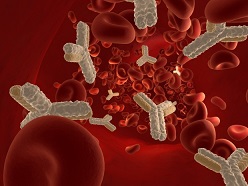BREAKING! French Study Discovers That Autoantibodies Neutralizing Type I Interferons Found Responsible For 20 Percent Of All COVID-19 Deaths!
Source: SARS-CoV-2 Induced Autoantibodies Feb 01, 2022 3 years, 2 months, 2 weeks, 5 days, 53 minutes ago
French researchers from Robert Ballanger Hospital-France, Necker Hospital for Sick Children-France and University of Paris have in a new study found that that
autoantibodies neutralizing type 1 interferons found responsible for 20 percent of all local COVID-19 deaths!
 The study findings shocking also found persistence of neutralizing Auto-Abs almost 1 year after COVID-19 infection in certain patients. Risk associated with this persistence is not known to date but must be explored, especially given the potential impact of these auto-Abs on the severity of other viral diseases, as described for adverse reactions following yellow-fever vaccination.
The study findings shocking also found persistence of neutralizing Auto-Abs almost 1 year after COVID-19 infection in certain patients. Risk associated with this persistence is not known to date but must be explored, especially given the potential impact of these auto-Abs on the severity of other viral diseases, as described for adverse reactions following yellow-fever vaccination.
The study team aimed to assess the prevalence and clinical impact of the auto-Abs to type I IFNs in the Seine-Saint-Denis district, which was one of the most affected areas by COVID-19 in France during the first wave.
The study team tested for the presence of auto-Abs neutralizing type I IFNs in a cohort of patients admitted for critical COVID-19 pneumonia during the first wave in the spring of 2020 in the medicine departments at Robert Ballanger Hospital, Aulnay sous Bois.
The team found circulating auto-Abs that neutralized 100 pg/mL IFN-α2 and/or IFN-ω in the plasma (diluted 1/10) of 7.9% (11 of 139) of the patients hospitalized for critical COVID-19.
The presence of neutralizing auto-Abs was associated with an increased risk of mortality, as these auto-Abs were detected in 21% of patients who died from COVID-19 pneumonia. Deceased patients with and without auto-Abs did not present overt clinical differences.
The study findings confirmed both the importance of type I IFN immunity in host defense against SARS-CoV-2 infection and the usefulness of detection of auto-Abs neutralizing type I IFNs in the management of patients.
The study findings were published in the peer reviewed Journal of Clinical Immunology.
https://link.springer.com/article/10.1007/s10875-021-01203-3
Numerous recent studies reported the presence of pre-existing autoantibodies (auto-Abs) neutralizing type I interferons (IFNs) in at least 15% of patients with critical COVID-19 pneumonia.
https://www.science.org/doi/10.1126/science.abd4585
Shockingly in another study, these auto-Abs were found in almost 20% of deceased patients across all ages.
https://www.science.org/doi/10.1126/sciimmunol.abl4340
Past studies showed that patients with neutralizing auto-Abs against type I IFNs were typically mostly men (94%) and that half were older than 65 years.
https://www.science.org/doi/10.1126/science.abd4585
It was also recently shown that proportion of patients with critical COVID-19 having neutralizing auto-Abs increased with age.
https://www.science.org/doi/10.1126/sciimm
unol.abl4340
In this study, although differences were not significant with regard to the patients without neutralizing auto-Abs, most of patients (82%) with neutralizing auto-Abs were men and over the age of 65 years.
The full engagement status was significantly less frequent in patient with auto-Abs than in patients without auto-Abs but like other studies, there was no difference for comorbidities.
https://pubmed.ncbi.nlm.nih.gov/33851338/
https://onlinelibrary.wiley.com/doi/10.1002/cti2.1327
It was also found that there was a significant correlation between the presence of auto-Abs neutralizing type I IFNs, raised levels of C-protein reactive, and low lymphocytes counts was observed, in this current study, no difference was seen for these biological characteristics.
The study findings found that neutralizing antibodies against type I INFs was described in almost all of patients with auto immune polyendocrinopathy syndrome type I and also in patients with thymoma, myasthenia gravis and systemic lupus erythematosus.
These autoimmune diseases were not described in patients with neutralizing auto-Abs, although 2 of 11 (18%) patients with neutralizing Auto-Abs against type I IFNs had a history of psoriasis. Research of antinuclear antibodies (ANA) did not reveal high titer of ANA in the 6 patients that were analyzed.
The study found that the presence of neutralizing auto-Abs was associated with a more frequent mortality. Up to 21% of patients who died of COVID-19 pneumonia in the study had auto-Abs capable of neutralizing 100 pg/mL type I IFNs in plasma 1/10. Deceased patients with auto-Abs did not present overt clinical differences with deceased patients without auto-Abs.
The study findings confirm importance of the IFN-I pathway in the defense against SARS-CoV-2 infection.
The detection of neutralizing Auto-Abs against type I IFNs is therefore important due to clinical applications, notably therapeutics. All COVID-19 patients should be screened for these autoantibodies in order to predict which patients infected by SARS-CoV-2 are at higher risk of life-threatening COVID-19. Moreover, early identification of COVID-19 patients with auto-Abs should prompt early treatment and preventive management.
The study findings alarmingly also found persistence of neutralizing Auto-Abs almost 1 year after COVID-19 infection in two patients. Risk associated with such persistence is not known to date but warrants urgent research, especially given the potential impact of these auto-Abs on the severity of other viral diseases, as described for adverse reactions following yellow-fever vaccination.
https://rupress.org/jem/article/218/4/e20202486/211761/Auto-antibodies-to-type-I-IFNs-can-underlie
The study team also stressed, “As high titers auto-Abs against IFN-2 in ELISA are well correlated with neutralizing activity of auto-Abs, such commercial ELISA should be used to detect easily, in routine clinical practice, neutralizing anti IFN-2 auto-Abs. Nevertheless, to our knowledge, no commercial ELISA exists to detect anti IFN- auto-Abs. It would be necessary to complete detection of anti IFN-2 auto-Abs with a functional evaluation of neutralizing anti IFN- auto-Abs, notably if low IFN-2 auto-Abs levels or no IFN-2 auto-Abs are detected.”
For more about
SARS-CoV-2 Induced Autoantibodies, keep on logging to Thailand Medical News.
